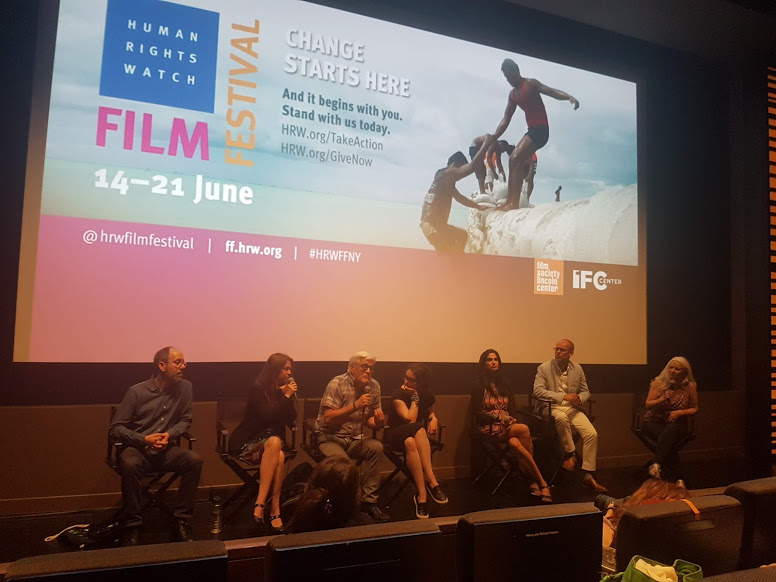Secondary menu
In the city that never sleeps, human rights activists never rest: My summer with Human Rights Watch
Chelsey Legge (4L JD/MPP)
 Panel discussion following the screening of The Silence of Others, with filmmakers Almudena Carraccedo & Robert Bahar, Chato Galante, film subject, Fernando Travesi Exec Dir, ICTJ and Param-Preet Singh, Assoc Dir, Intl Justic Program, HRW. Moderated by Emma Daly, Comms Director, HRW. Credit: Chelsey Legge.
Panel discussion following the screening of The Silence of Others, with filmmakers Almudena Carraccedo & Robert Bahar, Chato Galante, film subject, Fernando Travesi Exec Dir, ICTJ and Param-Preet Singh, Assoc Dir, Intl Justic Program, HRW. Moderated by Emma Daly, Comms Director, HRW. Credit: Chelsey Legge.
If someone had tried to tell me seven years ago that I would spend the summer of 2018 working for my dream organization in an office on the 34th floor of the Empire State Building in New York City, I would have laughed. Sometimes, though, dreams really do come true.
I spent May through July working as an IHRP fellow with the Women’s Rights Division at the Human Rights Watch (HRW) headquarters in New York. Working for HRW, particularly for the Women’s Rights Division, is something I’ve wanted to do since my first year of undergrad. In fact, my desire to work for HRW was a huge factor in my decision to apply to law school; most HRW researchers have a background in either law or journalism (and deadlines scared me off journalism a long time ago).
HRW is a non-profit, non-governmental organization, known for its accurate fact-finding, impartial reporting, effective use of media, and targeted advocacy, often in partnership with local human rights groups. The Women’s Rights Division at HRW works towards the realization of women’s empowerment and gender equality, protecting the rights and improving the lives of women around the world.
My main project this summer involved providing research assistance to Skye Wheeler, the emergencies researcher for the Women’s Rights Division, for an upcoming report on violations of the human rights of sex workers in South Africa. The report is based on Skye’s interviews with sex workers and other stakeholders in South Africa. Through this experience, I learned about the alarmingly high rates of intimate partner violence, rape and other forms of sexual assault. I discovered that South Africa has specialized sexual offences courts, and an innovative approach to post-rape care in the form of Thuthuzela Care Centres -- one-stop facilities where women can receive medical care and counselling, and file a police report if they wish. I learned, in disturbing detail, about the malicious treatment of sex workers by police officers, members of the public, and clients. Police abuses against sex workers are so well-documented, I compiled a separate annex of reports on these abuses published by South African NGOs over the past decade (the most recent report was published just last year by Sonke Gender Justice).
The work was often emotionally difficult, but I knew the end result -- the HRW report and its recommendations -- would be worth it. I’m confident that the report will have a positive influence on the ongoing debate concerning the future legal status of sex work in South Africa, and I’m so proud to have played a role in its creation.
It’s almost impossible to choose my favourite memory from this summer – my conversations with Skye, the lunchtime speaker series at the office, the meals at delicious vegan restaurants all around the city. However, the HRW New York Film Festival really stands out. The festival ran for a week in June and included 15 films, 12 of which were directed or co-directed by women. I managed to see nine films the week of the festival, and two in particular have stuck with me. The first was the opening night, aptly-named film On Her Shoulders, which tells the story of Nadia Murad -- you might recognize her name as one of the recipients of this year’s Nobel Peace Prize. Nadia is a survivor of the 2014 atrocities against the Yazidi community in northern Iraq. The film follows Nadia and her supporters as she pursues justice for her community. The audience bears painful witness to the intense toll it takes on Nadia to be a spokesperson and symbol of hope for her people. The second film I can’t stop thinking about was The Silence of Others. The documentary follows a group of victims and survivors of Spain’s 40-year dictatorship under General Franco. Their pursuit of justice is impeded by “the pact of forgetting,” a 1977 amnesty law prohibiting legal action related to the oppression, torture, and murder that took place during Franco’s regime. The film subjects implore the audience, and the powers that be, to realize that there can be no healing, no peace, without justice.
The film festival stands out as my favourite memory not only because of the compelling, heartbreaking, and inspiring films, but also because of the energy around the office during that week and all the people I was able to connect with before and after the screenings. I felt like part of a community of brilliant and compassionate people who are dedicated to justice and human rights. This feeling persisted throughout my summer at HRW, and even now, months later, it lingers. I am grateful beyond measure for this experience.
